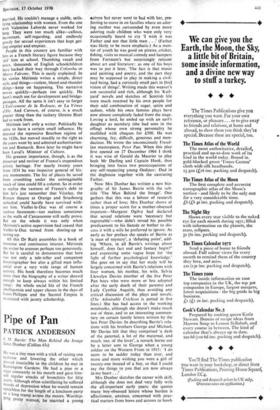The government inspector
DAVID WILLIAMS
Prosper Merimee A. W. Raitt (Eyre and Spottiswoode 90s)
Carlyle, hard and shrewd in his judgment of all men except himself, met Merimee in 1851. He thought him 'linguistically and otherwise of worth', but also 'a hard, logical, smooth but utterly barren man'. Gide, after reading one of the stories—La Partie de Tric- trac—experienced 'an intolerable impression of useless perfection and well done home- work', but liked Arsene Guillot: 'I never knew there was anything like that in Merimee. Why is it not better known? . . . better than anything I thought Merimee was capable of writing. Truly excellent.' Henry James approved with the perceptive remark: 'he seldom or never describes; he conveys'. Victor Hugo had little use for him, dismissing the literary courtier-in-chief of the Second Empire (who was it who called it 'the Second Tant Pire'?) as a 'fawning man of talent ... The Emperor's Jester'.
There's no unanimity of opinion about him then. But that he was formidable this book establishes beyond a doubt. In a letter written to Stendhal in March 1831 (not quoted by Dr Raitt) he says: 'Plus je vis et plus je vois vaut mieux etre craint qu'aime. But he was a strong man with a soft centre. Dr Raitt considers that `few people have cultivated the art' of friendship more successfully than Merimee'. I doubt this. Certainly he wrote long, abundant letters (splendid, scabrous reading some of them) to numbers of people, men of genius like Stendhal amongst them. Yet never all his life through did he address any of them as `tu' except one, the philologist Jean-Jacques Ampere who was a boy with him at the Lye& Henri Quatre. Sexually he was insati- able, a much-travelled man who on arrival in the next town looked for the brothel first and the hotel perhaps after. Yet he never
married. He couldn't manage a stable, sets. tying relationship with women. Even the one with Valentine Laborde never worked for long,. They were too much alike—callous, inconstant, self-regarding, and endlessly greedy for sexual experiences that kept_get- nog emptier and emptier. People in this country are familiar with him as a French literary figure because they 'did' him at school. Thumbing vocab and notes, thousands of English schoolchildren have hacked their Way through Colomba or Mateo Falcone. This is easily explained. In his stories Merlin& writes a simple, direct style, and things—violent, blood-and-thunder things—keep on happening. The narrative moves quickly—perhaps too quickly. He hasn't much use for development and bridge- passages. All the same it isn't easy to forget L'Enlevement de la Redoute, or La Venus Ole. And Carmen, of course, is a much greater thing than -the tushery libretto Bizet had to work from.
Merimee isn't only a writer. Politically he came to have a certain small influence. He detested the repressive Bourbon regime of the 1820s, but moved steadily to the right as ' the years went by and admired authoritarian- ism and Bismarck. Born later he might have been Laval's Minister of Culture.
His greatest importance, though, is as the preserver and reviver of France's stupendous artistic heritage. For nearly twenty years from 1834 he was inspector general of his- oric monuments. The list of places he saved from crumbling under the unimaginable touch of time could fill a column. So in order to realise the vastness of France's debt to him let's just remember that Vezelay, the Roman theatre at Orange and Strasbourg cathedral could hardly have survived with- out him. Viollet-le-Duc was of course a zealous lieutenant—too zealous sometimes as the walls of Carcassonne still sadly prove. But on the whole it was only when Merimee's active supervision had ceased that Viollet-le-Duc turned from shoring-up to tarting-up.
All this Dr Raitt assembles in a book of immense and continuous interest. Maim& the writer he assesses perhaps too generously. But he is careful to demonstrate that here was not only a tale-teller and competent historiographer but also a gifted man influ- ential over a very wide range of human activity. His book therefore becomes much more than the biography of a writer shrewd enough to keep always within his limited range: the whole social life of the French intelligentsia and upper classes in the days of Louis-Philippe and the Second Empire is re-created with jaunty scholarship.







































 Previous page
Previous page